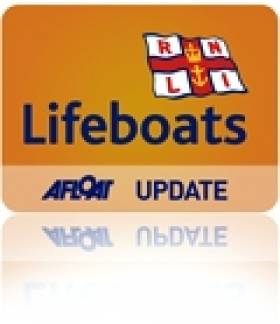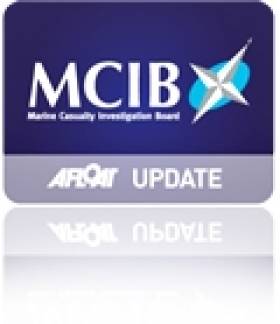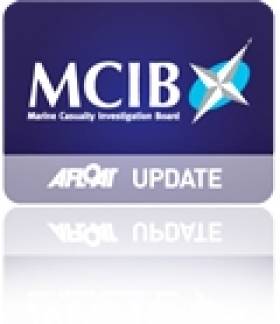Displaying items by tag: Beara Peninsula
#RNLI - The Castletownbere RNLI volunteer lifeboat crew have aided in the recovery of the body of a man from the sea some 2.4km off Travarra on the Beara Peninsula in West Cork.
The lifeboat launched at 1.35pm yesterday afternoon (Monday 22 July) and was joined by Irish Coast Guard helicopter Rescue 115, Derrynane inshore rescue and the Castletownbere coastguard.
A man believed to be in his earl 20s was sighted in the water at Travarra at around 2.30pm and recovered by a local vessel before being transferred onto the RNLI lifeboat and returned to Castletownbere. He was pronounced dead at the scene by a doctor.
Commenting on the call-out, Castletownbere RNLI deputy coxswain Paul Stevens said: “This is a terrible tragedy and we extend our sympathies to the young man’s family and friends.”
Dinghy Drowning Report Blames Poor Planning
#MCIB - Marine investigators have reiterated the importance of boaters informing people ashore of planned trips in their report into the drowning of a dinghy sailor in West Cork last autumn.
As reported last August on Afloat.ie, an afternoon sail by a father and son from the Beara Peninsula ended in tragedy after their Enterprise sailing dinghy capsized.
The body of John O'Leary from Allihies was found around 1.30am on Tuesday 14 August, just hours after he and his 18-year-son Christy had abandoned their overturned vessel to attempt the swim to shore.
The official report by the Marine Casualty Investigation Board (MCIB) found that the two had been sailing without incident in the area between Cod's Head and the Cullogh Rock for an hour or so before a gust of wind flipped their dinghy.
Unable to right the vessel, the O'Learys rested on the upturned hull to await assistance. But after many hours had passed and suspecting that the hull was starting to sink, they decided to swim to the shoreline some 800 metres away.
With 200 metres to go, John O'Leary encouraged his son to swim ahead to raise the alarm, which he did minutes later. But in the interim John went missing.
Some time into the search operation launched immediately by Castletownbere RNLI and assisted by the Irish Coast Guard from Allihies, John O'Leary's lifejacket was found in the water, and his body was located shortly after.
The MCIB report found that the Enterprise dinghy the O'Learys were sailing is of a kind notorious for its difficulty to right after capsizing. It was also noted that the craft had an insufficient buoyancy bags, which made it even more difficult to bail out once overturned.
But more importantly, the report found that John O'Leary, as skipper of the dinghy, had not arranged a return time or sailing area with anyone on shore prior to the trip.
"If he had done this, the rescue may have occurred before they decided to enter the water," the report said.
Neither man was wearing a wetsuit, exposing them to "the cold and stresses from the cold" which may have "impaired their decision making process" and prompted their decision to swim from the vessel, it added.
In its recommendations, the MCIB advises all sailors to inform a responsible person ashore of their itinerary, and to stay with their vessel as long as possible in the event of any incident on the water.
The full report into the dinghy capsize is available to download below.
Double Tragedy for Beara Peninsula as Retired Teacher Drowns
#NEWS UPDATE - The Irish Times reports that the body of a retired schoolteacher was recovered from the sea off Castletownbere in West Cork on Friday in the second tragedy the area has seen this week.
Sixty-six-year-old Pearse Lyne drowned after his fishing boat capsized in poor weather off the Beara Peninsula.
A search operation was launched around 1.30pm after a cliffwalker spotted the upturned vessel near the Dzogchen Buddhist retreat, and the body of the father of four and former national school principal was discovered some 90 minutes later in the water near Pulleen harbour.
The sad incident occurred just says after farmer and poet John O'Leary drowned off Cod's Head when the Enterprise sailing dinghy he was sailing with his teenage son Christopher capsized.
As previously reported on Afloat.ie, Minister for the Marine Simon Coveney paid tribute to O'Leary as well as Quilty fishermen Michael Galvin and Noel Dickinson, who drowned earlier this week off the Clare coast.
Meanwhile, in Dongeal a diver was rescued after getting into difficulty in Lough Salt on Thursday evening, according to the Donegal Democrat.
The Donegal native was one of two divers in the lough at the time, and is believed to have experienced buoyancy issues while some 50m below the surface.
He was taken to Letterkenny General Hospital and later transferred to Craigavon for treatment for decompression sickness. The man is now recovering.
His diving partner, an Italian national living in Ireland, made it to shore unharmed.
Four Deaths At Sea Set To Be Investigated
#MCIB - The bodies of two fishermen missing off Co Clare have been recovered, as The Irish Times reports.
Local divers found the remains shortly before lunchtime yesterday near Spanish Point as coastguard teams searched for a missing fishing boat.
As previously reported on Afloat.ie, the Lady Eileen - with two crew on board - was due to return to Quilty on Monday evening.
Searchers discovered debris and diesel in the water near Spanish Point in the early stages of the search on Monday night.
Meanwhile, the body of a father-of-three from Clare Island in Co Mayo was recovered from the sea by local fishermen last night.
The man - whose name is being withheld till all relations have been informed - was reported missing by a relative after he failed to return from a fishing trip in his currach.
The Marine Casualty Investigation Board (MCIB) is expected to open investigations into both incidents, as well as the death of John O'Leary of Allihies in West Cork, who lost his life after the Enterprise dinghy he was sailing with his son capsized off the Beara Peninsula on Monday.



























































